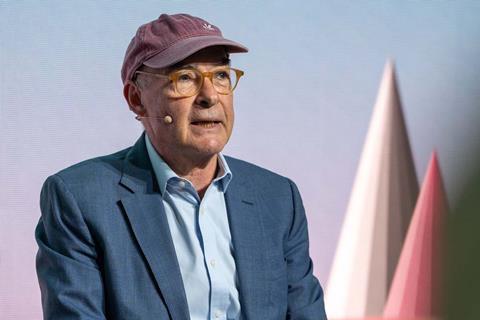
The second edition of South International Series Festival [October 25-30] opens today in Cadiz, Spain.
Festival director Joan Álvarez — formerly director of the Valencia Film Archive and general director of the Spanish Academy of Cinema — talks to Screen about why it’s important to have an event devoted entirely to television content, his plans for the festival and why he believes the future of TV is so bright.
How does the South International Series Festival position itself within the European and Spanish event circuit?
We are the only festival exclusively dedicated to series. Major Spanish and international events are increasingly opening up to series but how? Series don’t enter like films do, they come in through the back door.
Those series, mainly backed by major North American platforms, are looking to gain the legitimacy that comes with a prestigious festival. We don’t play that game. Our philosophy is to give series the highest cultural recognition. We believe series is the format with the largest audience and have the most promising future within the entire audiovisual storytelling ecosystem.
This year marks the second edition of the festival. What are your ideas or strategies for the festival’s growth?
This year we have almost the same partners and sponsors, and it’s growing well. We have series and industry guests from nine countries. Our focus is on France, one of the world’s leading powers in series production and distribution. What we aim for is that, from the third edition onwards, we can combine our attention on established industries with those that are emerging.
For example, this year, we will be hosting the ambassador of Pakistan, and we are already working on showcasing the Pakistani series industry which, as is well known, is thriving. This is the type of growth we are committed to.
The Spanish-speaking audiovisual market is vast. However, the different variations within the language often create difficulties in understanding across various regions. Could platforms with an on-demand subtitling system offer a solution?
I directed the Cervantes Institute [responsible for the promotion of Spanish culture] in Stockholm and later the Cervantes Institute in Casablanca, so I’ve worked extensively on bridging cinema diplomacy with that of the Spanish language. In fact, at this year’s South Festival, we are kicking off the industry activities with a forum for Spanish-language series creators. We’re organising it with Dama [the Spanish audiovisual authors’ rights collection agency], and our goal is to open a space for reflection on how to create a shared workspace for series creation in Spanish.
A talented Mexican screenwriter once said she preferred having Chilean films subtitled because she couldn’t fully understand them. Subtitling is certainly something to consider. What I’m proposing with Dama and the South Festival is that we work towards closer collaboration to find a common approach or solution.
When discussing series, there’s often talk of changes in distribution and exhibition models, but little about the transformation of storytelling techniques and roles. Is that an important topic to address?
Absolutely. Take the role of the showrunner, for example. It doesn’t make much sense in narratives with the typical length of a feature film – between 90 and 150 minutes. However, it becomes essential for audiovisual narratives that span seven hours or more and may even extend into a second, third, or fourth season. And when a series becomes successful, it’s crucial to maintain a dialogue with the fanbase. The showrunner is someone who must interact with these communities and absorb their input in creative terms. We also can’t forget about the issue of AI, which will also be addressed in South’s industry section.
Finally, what are some of your festival highlights?
South will showcase a total of 50 series. Among them, 15 are Spanish premieres, and 12 are world premieres. We’ll be presenting the Portuguese version of La Que Se Avecina [one of Spain’s most successful sitcoms, with 12 seasons], a production by Portugal’s top private broadcaster TVI, in collaboration with Prime and See My Dreams. I’d like to emphasise this because we’re very interested in the internationalisation of Spanish productions.
We also have two Andalusian documentary productions: one about Paco de Lucía and another about Tartessos [the historical civilisation that developed in the southern Iberian peninsula]. Additionally, we have Invisibles, about Latinos arriving in the US, a production involving the UNHCR and Ecocinema, as well as Alive, produced by the UK’s ITN Productions and distributed by Banijay.
I also want to highlight I Spit On Your Graves (Escupiré sobre vuestras tumbas), a production from the Colombian broadcaster Caracol TV, which we believe is the quintessential Colombian melodrama and will be closing South Series 2024.
”

























No comments yet